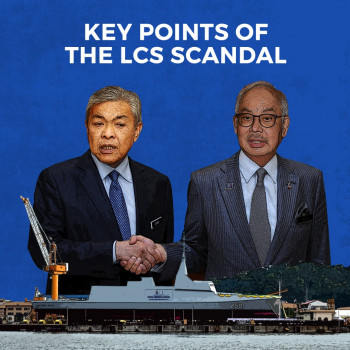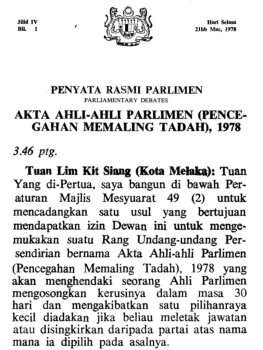In a State of Limbo
 They were born in Malaysia, but have no documents to prove it – their parents never registered their births, or other legalities got in the way. Unable to prove citizenship, they are denied basic rights and live in constant fear of detection from authorities.
They were born in Malaysia, but have no documents to prove it – their parents never registered their births, or other legalities got in the way. Unable to prove citizenship, they are denied basic rights and live in constant fear of detection from authorities.
The predicament of statelessness is a heartbreakingly simple one, yet solutions for unrecognised Malaysians have been slow and hard to come by. Official statistics of unrecognised Malaysians hover around the region of 12,000. But other NGOs have put the figure as high as 300,000 – many of them are Indians.
While the federal government has launched the MyDaftar campaign to assist undocumented Malaysian-born residents to obtain proper documents, so far less than 6,000 cases have been processed.
Member of Parliament (MP) for Ipoh Barat, M. Kulasegaran, criticised the Special Implementation Task Force for the Indian Community set up by Datuk Seri Subramaniam because it is on a temporary basis, seemingly to fish for votes. “A more intelligent government will make long term policy initiatives to tackle the problem holistically,” Kula said.
In a June Parliamentary reply to M. Kula, the Home Ministry answered that out of 62,309 applicants for identification documents, only 29,848 had been approved. The rest had been rejected as they did not comply with the requirements.
“The fact that this long standing issue cannot be resolved makes the BN slogan of ‘People First, Performance Now’ ring hollow,” Kula said.
Without valid identification papers, stateless children are forced to quit school. Adults find it hard to get a job, are not eligible for EPF and SOCSO contributions, and cannot vote. Without documents, how will they get a marriage license, or register their future children as citizens?

This comic titled ‘Najib’s Transformation’ is distributed to school kids. Will the BN government take serious steps to address the Indian community’s poverty?
Mired in Poverty
Today, nearly 70% of Indians earn a monthly wage of below RM700 a month. When you think about it, that is an astounding figure. In this day and age, how can RM700 be sufficient to bring up a family, especially in urban areas?
The stereotype of “poor estate Indians” has its roots in the heavy reliance of early Indian Malaysian settlers on the plantation economy. This was recognised by MCA-linked think tank Centre for Public Policy Studies in its report titled ‘The Case of Low Income Malaysian Indians’.
While many Indians today no longer live in estates, the emergence of the urban poor as a social class and pockets of urban slums have left the community vulnerable to crime, alcoholism, and other social problems – all this cannot be separated from the core issue of poverty that has had an especially marginalising and crippling effect on the Indian community.
Back in 2000, the Federal Government announced that it would achieve the target of 3% equity for the Indian community by 2010. However, when 2010 came along and the target was not met, the deadline was postponed to 2020 instead. Currently, Indian equity stands at 1.2%.
Kula says, this shows the lack of seriousness on the part of the federal government to tackle the far-reaching issue.
Poverty eradication is a task to be tackled beyond race, religion or class, all communities must be empowered for Malaysia to become a high-income nation. Poverty is a stumbling block to national economic competitiveness, at the same time it divides us. No community should be left out in the nation’s progress.
Trapped in Social Problems

Cheap brew – homemade spirits like samsu and toddy are as cheap as RM1.50 per bottle, an easy but potent escape for many poor labourers
With the vicious cycle of poverty, comes the barrage of social problems that cannot be separated or discussed in isolation from the root cause.
Many Indians speak of the sense of marginalisation, displacement, and alienation, of feeling like third class citizens. This is not just a feeling. Statistics paint a tragic picture of a bad dream and broken promises.
The Indian community in Malaysia has the highest rate of unemployment, suicide, crime involvement, alcohol addiction and school dropouts. More than any other community, Indians also record the highest level of death in custody and lowest life expectancy rate.
Over the past half century, BN’s powerlessness to provide concrete solutions to solve the manifold issues besetting the Indian community has lost it a lot of trust from voters. Promises to uplift their dignity have turned up empty, as more than one generation has been born into a disadvantaged situation with few avenues out of it.
Alcohol addiction is a cheap and irresistible escape from the harsh reality of poverty. Easy availability of cheap home-brewed alcohol makes it easy for a frustrated worker or forlorn lover to pick up a bottle of toddy or samsu. According to a survey conducted by the Consumer Association of Penang, there are around 150 brands of samsu, with the cheapest bottle of costing RM1.50.
Tamil Schools Need Attention
 There are 528 Tamil type schools in Malaysia. Vernacular education has been passionately debated in the public sphere, but still these schools lack attention and resources.
There are 528 Tamil type schools in Malaysia. Vernacular education has been passionately debated in the public sphere, but still these schools lack attention and resources.
One of the problems faced by Tamil schools is the dwindling enrolment numbers, currently there are 58 schools which have less than 25 students. M Kula estimates that 70% of Indians now live in urban areas, however 70% of the existing Tamil schools are located in rural areas.
Infrastructure wise, many Tamil schools are in dilapidated condition. Klang Assemblyman Charles Santiago called on the federal government to stop discrimination against Chinese and Tamil Schools, and to allocate equal education resource for all schools.
Tronoh Assemblyman V. Sivakumar points out that SJK(T) Changkat with 373 students has no school field and is forced to rely on the Majlis Daerah Batu Gajah field for its yearly sports day.
In Petaling Jaya, SJK(T) Effingham faced a quandary after the previous BN government alienated a 3-acre plot of land belonging to the school to MIC. Five members of the Return Effingham Land Action Team (Reflax) went on a hunger strike in May this year. MIC later cancelled plans to build its headquarters on the land, instead agreeing to use the land for a hostel and sports field.
Besides infrastructure, there is also a dire need to improve the quality of teaching and learning in Tamil schools. Research by Aliran shows that Tamil school students performed more poorly in the UPSR examination than their counterparts in the National and Chinese type schools.

DAP has spoken out against development near Batu Caves since the 1970s
The nation’s numerous Hindu temples have always been symbolic of the Hindu community and its culture.
The Selangor PR state government has set up a special task force to cancel the 29 storey service apartment project by Dolomite Sdn Bhd in Batu Caves, which was approved under the previous BN administration. Deputy Minister A Kohilan Pillay was a councillor in the Selayang Municipal Council which approved the project.
The controversial project is planned to be just 120m away from the Lord Murugan statue, causing devotees much unease at the safety of the renowned temple built amidst 400 million year old limestone caves. A stop work order has sinced been issued. State Exco Ronnie Liu said that the state government must act professionally in dealing with this matter because 60% of the condominium units have already been sold.
On Deepavali, Prime Minister Najib Razak announced that if BN wins power in Selangor in the coming election, it will cancel the condo project. M. Kula and other DAP leaders have questioned why the previous BN government approved the project in the first place? -The Rocket




